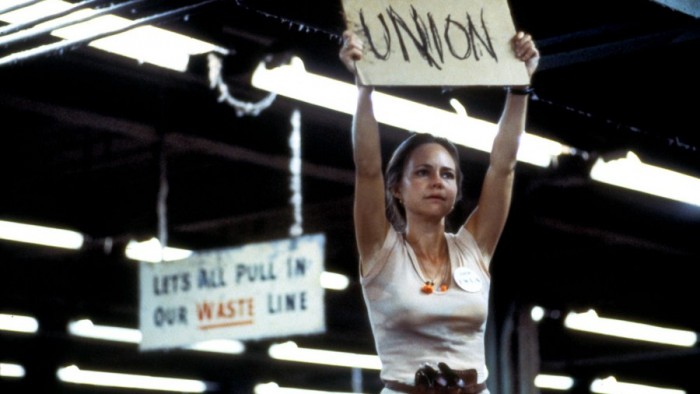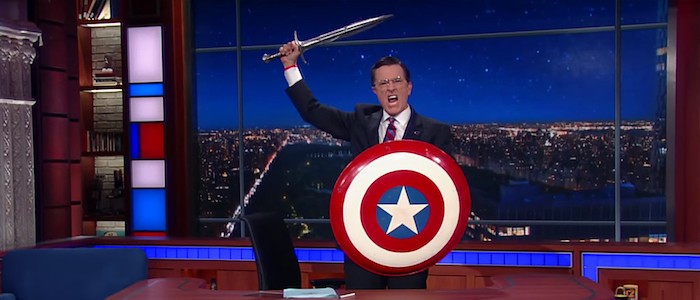Everything You Need To Know About The Pending Writer's Strike
At this point, your memories of the 2007-2008 WGA strike might be fuzzy. You might remember Tina Fey holding a picket sign, or Conan O'Brien spinning his wedding ring on television after his writing staff walked away. But otherwise? That was ten years ago. We had just gotten iPhones for the first time, the last Harry Potter book was out, and honestly, everything else is kind of a blur.But those memories are about to come flooding back as the Writers Guild of America considers another potential strike. Today, the WGA will finalize a strike-authorization vote. If its members vote to authorize, the guild has the power to call a strike. It'll do just that if ongoing contract negotiations break down between the WGA and the Alliance of Motion Pictures and Television Producers (AMPTP). Should that happen, the strike would commence as early as May 2.Now what does all that mean, exactly? We're glad you asked. Here's a basic rundown.
So, What’s Going On Here?
The WGA is divided into two groups: the WGA East and WGA West. Most of the time, they function separately. But when it comes to matters of collective bargaining, the guild unites to represent the 12,000 writers in its membership. That membership covers both TV writers and screenwriters.The AMPTP, meanwhile, is a trade group that represents over 350 studios, networks, and production companies. That includes heavy hitters like Paramount, 20th Century Fox, and Sony. The AMPTP currently has a contract with the WGA, but it expires on May 1. That's why the two groups began negotiations for a new three-year contract on March 24. But those talks didn't go according to plan. Somewhat unexpectedly, the WGA brought a number of demands to the table. This already makes the 2017 situation much different from what happened in 2007, since everyone saw that strike coming. The WGA had, back then, been preparing to strike for more than a year. But this time around, the (potential) strike is a bit more hasty – and that could make it even more catastrophic. As Variety explains, studios have had less time to stock up on completed scripts, which means if the strike begins on May 2, several movies and TV shows in production could be in serious trouble.
What Does the WGA Want?
Alright, so that's what is happening. But why is it happening? For a couple reasons, actually. In 2007, the WGA went on strike over one major cause: residuals. Writers wanted residuals on DVD sales as well as streaming digital content, which was a fairly new issue at the time. But now, the guild has a number of causes it's championing.The first is wages. Vulture reports that between 2009 and 2015, the number of scripted shows nearly doubled. But writers aren't seeing a subsequent payday in this era of "Peak TV." In fact, their salaries have decreased by an average of 23 percent. The WGA explained what's fueling those cuts in a contract bulletin. While there are many shows on television, they're trending towards shorter seasons. Shorter seasons translates to less episodes, which means writers lose out on extra episode fees. But they're working longer on those episodes, and forbidden from working on other shows while they're on hiatus. (Most shows hold writers exclusive and under option for the next season.) Normally, they could at least pick up some more cash on reruns, but those residuals aren't what they used to be. The WGA also contends that episode fees at basic cable shows, streaming services like Netflix and Hulu, and The CW do not match the standards set at networks. Whereas a TV writer could make $26,043 penning a half-hour script at a broadcast network, he/she would make $14,621 writing that same half-hour episode on basic cable.The WGA is further asking for "modest gains for screenwriters, most particularly a guaranteed second-step for writers earning below a certain compensation level." According to The Hollywood Reporter, the WGA contends that screenwriters have also seen a decrease in wages since the 2007 strike and the national recession that soon followed.Wages are a big sticking point here, but they aren't the only motivating factor. The WGA is also calling for a better healthcare plan. The current plan is a little shaky, to say the least. It's racked up some pretty significant deficits over the past few years, and those aren't likely to slow down. By the WGA's estimate, the plan will accrue $145 million more in deficits over the next four years, going completely broke by 2020. The guild wants the AMPTP to increase its funding to the health plan, and also improve pensions and family leave while they're at it.
What Happens If the WGA Goes on Strike?
Let's say the WGA and AMPTP fail to reach a deal, and come May 2, the writers exit all AMPTP projects. What would that look like for movies and television? Well, you'd see some shows go dark almost instantly. WGA West executive director David Young sent a letter to ad buyers earlier this month warning of the implications of a potential strike. Late night shows Saturday Night Live, The Late Show with Stephen Colbert, The Tonight Show Starring Jimmy Fallon, Jimmy Kimmel Live, The Daily Show, and Full Frontal with Samantha Bee would go off the air "immediately," he writes. Young also notes that scripted series scheduled for the summer could be affected – although Game of Thrones, Orange Is the New Black, and Twin Peaks are all safely in the can. The fall television season, he explains, could be "significantly" affected.Which specific shows will feel the heat? As Uproxx notes, you need only to look at series scheduled to begin shooting in May. American Horror Story, Jessica Jones, Star Trek Discovery, and The Walking Dead all fit that bill.The impact a strike would have on movies is less clear, since we don't know how long it would theoretically go on. Film has a lot more lead time than television, so there wouldn't be an obvious, immediate effect. In fact, a short strike might not even register. But as the 2007-2008 strike proved, a long strike can hit hard. Transformers: Revenge of the Fallen, G.I. Joe: The Rise of Cobra, Star Trek, Quantum of Solace, and X-Men Origins: Wolverine were a few of the films that worked with famously rushed or incomplete scripts. Even if you put aside the critical scorn many of them earned, it's probably not a great sign when one of your stars later admits, "I fucking hate that movie."
So Is This Strike On or What?
It's important to remember that the WGA is still just voting to authorize a strike. Should the guild come back with an affirmative vote next week, that doesn't necessarily mean the strike is a go. The WGA would still have to separately call for one, authorization in hand.
Right now, Hollywood insiders are putting the odds of a strike around 51 percent. The WGA and AMPTP have seemingly reached some common ground on wages, but healthcare is another story. The definitive answer will arrive by May 1, when the old contract expires. If there isn't a new one to take its place, start settling in for Walking Dead reruns, because the WGA is on strike.
